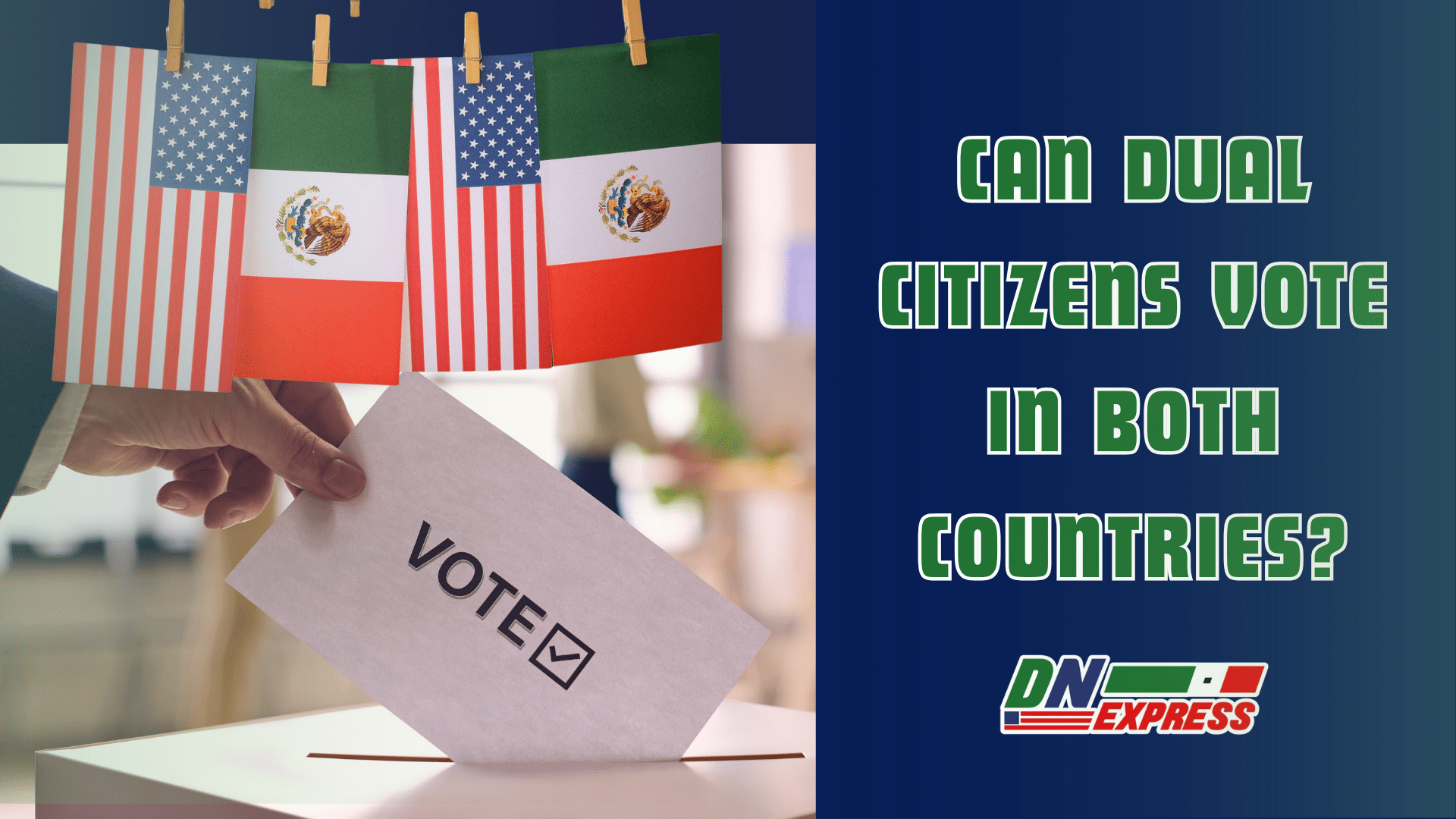
Yes, dual citizens of Mexico and the U.S. can vote in both countries, as long as each nation's legal requirements are met. But the process depends on where you live, how your citizenship was obtained, and whether you're registered properly.
If you're a dual citizen navigating life across two nations, the question of where, and if, you can vote is far from legal trivia. It touches your identity, your rights, and your connection to each homeland.
The answer is straightforward: yes, voting in both countries is legal, but the details matter. From voter IDs to registration deadlines, the ability to participate fully in civic life depends on whether you've followed the necessary steps in each system.
We help you become a dual citizen and make sure you're fully recognized in both countries, with the documents, rights, and voting power to prove it. Whether you're reclaiming your family's heritage or planning to retire in Mexico, we'll guide you through the process step-by-step.
Want to know exactly how it works, and how to avoid mistakes that could block your right to vote in either country? Let's break it down.
How Voting Rights Vary by Life Situation
Dual citizenship has no one-size-fits-all approach. Whether you're reconnecting with your roots, protecting your kids' future, or preparing for retirement, your path to voting in both countries may look a little different.
Here's how the rules, and realities, play out across situations we see with Doble Nacionalidad Express:
Reclaiming Heritage
If you were born in the U.S. but have Mexican parents, voting in Mexico is entirely possible, but only if you complete the right steps.
After reclaiming your citizenship, many are surprised to learn that holding a Mexican birth certificate or passport won't suffice. You still need to obtain an INE card (Mexico's voter ID) and register in the Padrón Electoral.
For many of our clients, casting their first vote in Mexico becomes a deeply emotional milestone. It goes beyond policy; it's a statement of identity and belonging on both sides of the border.
Avoiding the Consulate
A growing number of Mexican-Americans are securing dual citizenship without ever stepping foot in a consulate, thanks to remote legal services.
But here's the catch: many of these fast-track citizenships don't include INE registration, which means you can't vote in Mexico until that final step is complete.
We see this often: clients get their citizenship, think they're done, and then hit a wall come election time. If your goal includes voting in Mexico, make sure your process includes voter ID issuance, not only nationality documents.
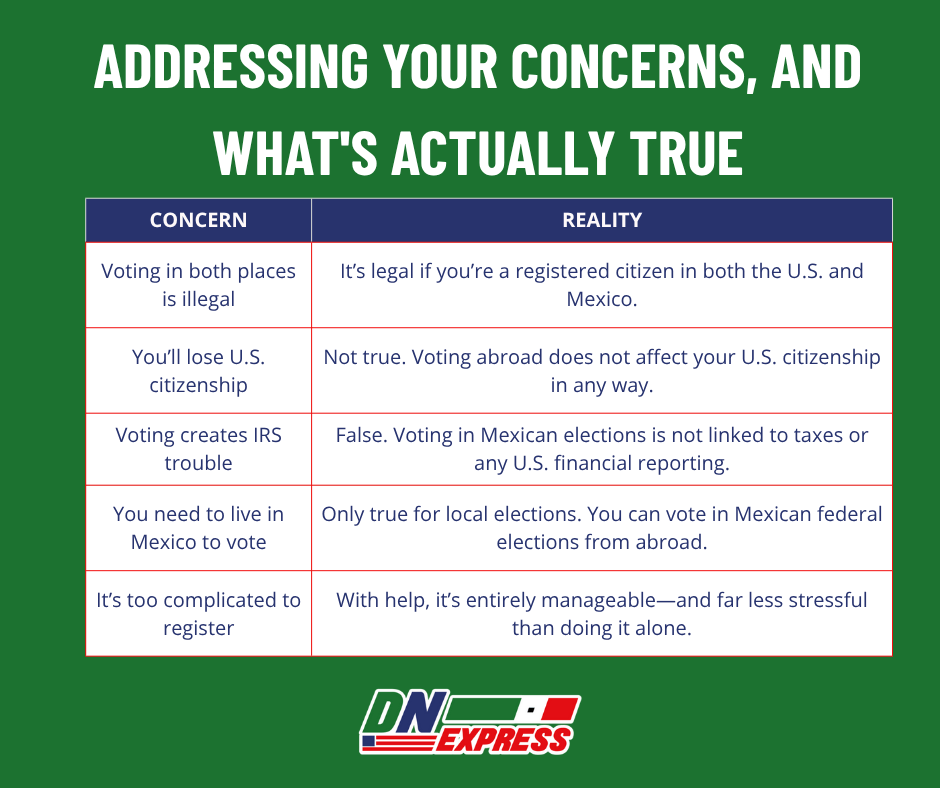
Travel, Property, and Retirement
Planning to retire in Mexico, buy property, or live part-time in both countries?
You'll want full civic rights, including the ability to vote on local infrastructure, taxes, and development issues. Here's what to know:
- Federal elections (like president or Senate) can be voted from abroad.
- Local elections (like mayor or governor) may require in-person registration or residency in the corresponding district.
We help retirees and snowbirds navigate these distinctions so they're not locked out of decisions that affect their homes and communities.
Legalizing Children's Status
Parents often pursue dual citizenship for their U.S.-born kids to protect future access to education, healthcare, and mobility across borders.
But voting? That's a right that kicks in later.
- Minors cannot vote, even if they hold dual citizenship.
- Once they turn 18, they're eligible to vote in both countries, provided they're properly registered.
We help families set the foundation early so their children can step into full binational rights when the time comes.
Fixing Documentation Issues
This is one of the most overlooked barriers to voting in both countries: messy paperwork.
People with name mismatches, missing records, or corrected birth certificates often find themselves disqualified from voter registration deadlines, despite being legitimate dual citizens.
Here's the truth: dual citizenship does not automatically prove voter eligibility. In both the U.S. and Mexico, you must meet the specific documentation and deadline requirements of each country's electoral body.
If your documents are not aligned yet, voting may not be an option this cycle. But it can be fixed with certified document translations and name corrections when needed.
We've helped thousands correct their records and reclaim not only their nationality, but their political voice.

Where Dual Citizens Can Vote (And How)
Being a citizen of two countries means you may have the right to vote in both, but only if you follow the legal steps to activate that right.
Let's break down how voting works in each country, what you need, and the pitfalls to avoid.
Voting in the U.S.
As a U.S. citizen, your voting rights are protected whether you live in California or Cancún.
- You can vote in federal, state, and local elections, even if you hold another nationality.
- If you live outside the U.S., absentee ballots allow you to vote by mail, as long as you're registered in a U.S. state.
- You do not lose your right to vote by moving abroad or by holding another passport.
This applies to all dual nationals, including those who've naturalized in Mexico. The U.S. government does not penalize citizens for participating in foreign elections either, contrary to what many people fear.
Concern: Can I vote in the U.S. if I now live in Mexico?
Yes. As long as you're registered in a U.S. voting district and request an absentee ballot, you're eligible.
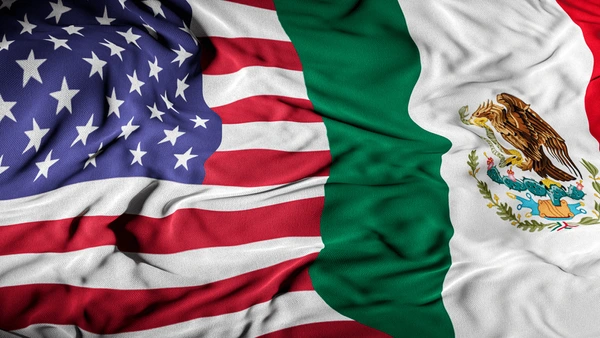
Voting in Mexico
Mexico grants full voting rights to its citizens, even those born abroad.
But there's one required step: you must register with INE (Instituto Nacional Electoral) and obtain your credencial para votar, the Mexican voter ID.
- You must be on the Padrón Electoral (voter roll) and meet deadlines for mail-in or in-person voting.
- Mexico allows citizens abroad to vote by mail in presidential and other federal elections.
- For state or municipal elections, you may be required to register and vote in person in Mexico.
Mistake: Many new citizens assume their Mexican birth certificate or passport is enough to vote. It's not.
Without an INE card, you are not eligible, even if you're a documented citizen.
Client Insight: We've helped hundreds of clients who thought they were ineligible to vote, only to realize they simply lacked the INE ID. Once they got it, with our help, they felt empowered to participate fully in Mexico's democracy.
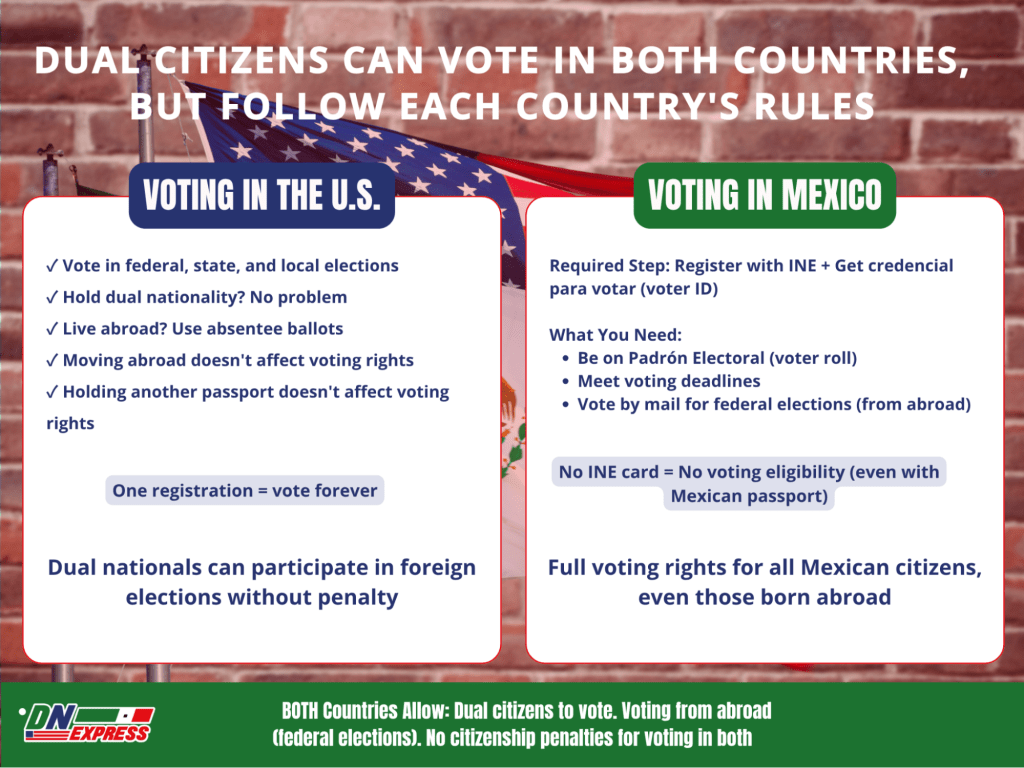
Addressing Your Concerns, And What's Actually True
If you've been hesitant to vote in both countries, many share your concerns.
Many of our clients come to us with legitimate worries, some based on legal confusion, others rooted in years of misinformation. Here's the truth behind the most frequently asked questions:
|
Concern |
Reality |
|
Voting in both places is illegal |
It's completely legal, as long as you're a registered citizen in both countries. Neither the U.S. nor Mexico prohibits dual nationals from participating in elections. What matters is that you're officially enrolled in each country's voting system. |
|
You'll lose U.S. citizenship |
Not true. Voting in a foreign election does not threaten your U.S. citizenship. The U.S. government recognizes that dual nationals often have civic ties to both countries and has long protected the right to vote abroad. |
|
Voting creates IRS trouble |
This is a myth. The IRS doesn't track your voting activity, only your income and tax filings. Participating in Mexican elections does not trigger audits, reports, or penalties. |
|
You need to live in Mexico to vote |
You can vote in federal elections from abroad once you're registered with INE and listed in the electoral roll. Only local and municipal elections may require in-person or in-country registration depending on your Mexican state. |
|
It's too complicated to register |
It's complex if you're doing it alone. But with the right guidance, it's entirely manageable. We've helped thousands of people not only gain citizenship, but also ensure they can vote confidently and legally in both countries. |
Why You Should Work with Doble Nacionalidad Express
Voting is a right, but for many dual citizens, it doesn't always feel like one.
Between missing paperwork, long waitlists at consulates, and confusing requirements on both sides of the border, too many people are locked out of the process.
We help you become a dual citizen and make sure you're recognized, registered, and ready to vote, in both countries you call home.
What We Do for You
- Secure dual citizenship without ever stepping into a consulate
- Fix documentation issues that could block your voter eligibility
- Ensure you get both your Mexican passport and your INE voter ID
- Break down the rules of voting in the U.S. and Mexico, so there's no guesswork
- Guide you through registration deadlines, appointments, and ID steps with professional support
We've built a process that's fast, legal, and designed for families living in the U.S., even if you've been told “no” before, or feel like it's too late.

What Happens If You DIY
- You could miss registration deadlines or end up with invalid paperwork
- Your application might get rejected by consulates due to technical or translation errors
- You'll spend dozens of hours navigating outdated online forms and government phone lines
- Worst of all, you might find out too late that you're not eligible to vote this cycle, even though you're a legal citizen due to lengthy processing delays
You don't have to go through that.
We've helped thousands of people, like you, fix their paperwork, reclaim their rights, and finally feel seen in both countries they belong to.
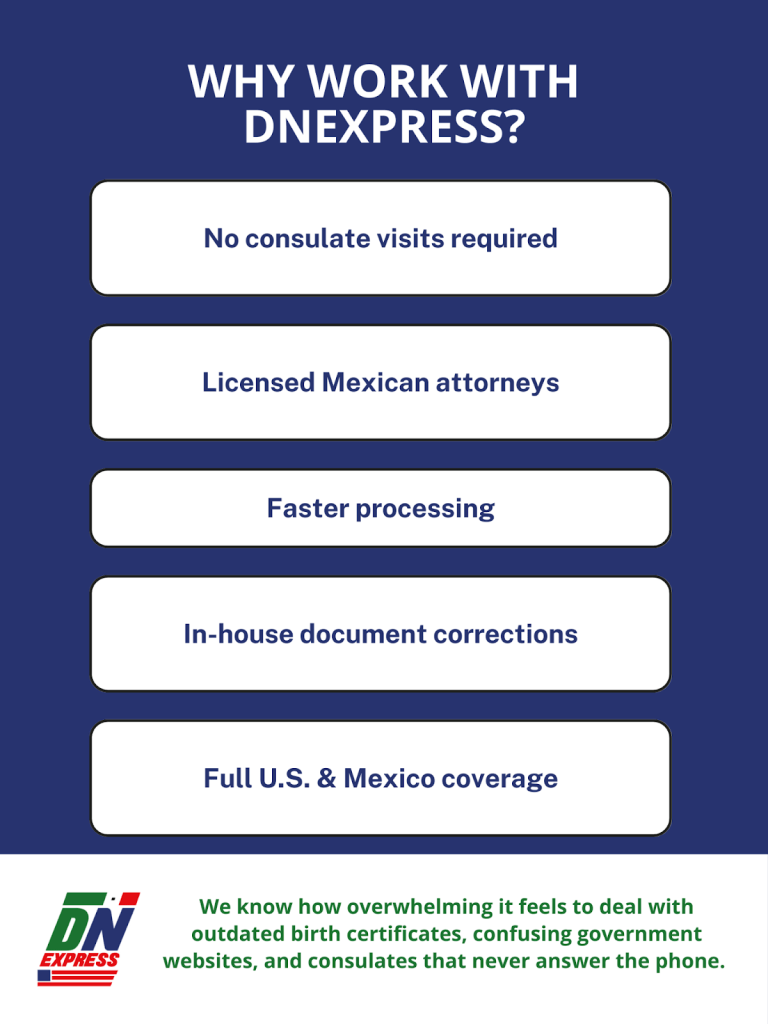
Ready to Vote Confidently in Both Countries?
Whether you're reclaiming your family's legacy, preparing to retire in Mexico, or securing a future for your children, your vote goes beyond a ballot, it's a declaration of identity, belonging, and empowerment.
We help you go beyond paperwork. We make sure you're seen, counted, and respected in both nations you call home.
- You're a citizen.
- You have rights.
- And yes, you can vote in both countries.
Call or Message Us on WhatsApp. Let us help you step into your full binational power, because your voice matters on both sides of the border.
Questions You Might Be Asking
If you're new to dual citizenship, or trying to figure out what your rights actually are, many share your situation.
According to recent naturalization studies, these are the most frequent questions we hear from clients across the U.S. and Mexico. Here's what you need to know:
Can dual citizens vote in both countries?
Yes. Both the U.S. and Mexico allow dual citizens to vote, provided you're properly registered and have the correct voter ID for each country.
There is no legal conflict in participating in both systems.
Where can dual citizens vote?
In the U.S.: You can vote in all federal, state, and local elections, either in person or by absentee ballot if you live abroad.
In Mexico: You can vote in federal elections from abroad once you're registered with INE through their voting from abroad system. For local or municipal elections, in-person registration may be required depending on your Mexican state.
Can a U.S. citizen vote in a foreign election?
Yes, as long as you're also a citizen of that country and comply with its election laws.
Mexico fully allows U.S.-born dual citizens to vote in its elections once they hold Mexican nationality and are registered.
Can dual citizens be President?
In the U.S.: Only natural-born U.S. citizens can become President.
In Mexico: Citizens who have acquired another nationality (like U.S.) are constitutionally barred from running for President, even if born in Mexico.
Do dual citizens pay taxes in both countries?
Yes and no.
The U.S. requires all citizens to file taxes regardless of where they live.
Mexico taxes based on where you live and where your income is earned. Tax treaties between the two countries help avoid double taxation, but professional advice is often needed to file correctly. Understanding dual citizenship costs can help you budget accordingly.
If you have dual citizenship, can you live in both countries?
Absolutely. Dual citizens can legally live, work, attend school, and receive public services in both the U.S. and Mexico without restrictions.
It's one of the most powerful benefits of binational identity.
What are the 3 requirements to vote in the U.S.?
According to official government guidelines:
- Be a U.S. citizen
- Register to vote in a U.S. state
- Be at least 18 years old by election day
If I vote in Mexico, will that show up on my U.S. record?
No. The U.S. does not track or penalize lawful participation in foreign elections.
Voting in Mexico will not affect your U.S. citizenship or standing.
Can I vote in Mexico if I was born in the U.S.?
Yes. Once you obtain Mexican citizenship and receive your INE voter ID, you are eligible to vote, like any Mexican-born citizen.
Does voting in Mexico affect my taxes?
No. Voting in Mexican elections does not trigger tax obligations or audits in either country.
This is a widespread misconception, but it's completely false.
What if I missed Mexico's voter registration deadline?
Unfortunately, you'll have to wait until the next election cycle.
Mexico has strict registration windows, and late applications, even by a day, are not accepted. That's why we help our clients stay ahead of deadlines from the start.



